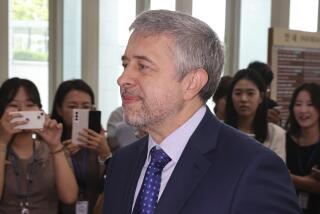China seeks emergency meeting on Koreas
- Share via
Reporting from Beijing — China called Sunday for an emergency international meeting to ease tensions on the Korean peninsula, but the United States and South Korea, engaged in large-scale war games nearby, appeared initially cool to the idea.
The proposal followed a rare burst of shuttle diplomacy by the Chinese, who have been stung by accusations that they have failed to rein in their ally North Korea.
Chinese State Councilor Dai Bingguo, the highest-ranking foreign policy official, flew to Seoul over the weekend to meet with South Korean President Lee Myung-bak, and Chinese Foreign Minister Yang Jiechi spoke by telephone with Secretary of State Hillary Rodham Clinton and to his Russian and Japanese counterparts. The U.S. ambassador to Beijing, Jon Huntsman, was spotted Sunday afternoon leaving the Foreign Ministry building in Beijing. A North Korean official, Choe Tae Bak, has been called to Beijing for meetings Tuesday.
Despite the diplomacy, the scene off the west coast of the Korean peninsula Sunday was about the show of force. U.S.-South Korean naval exercises are to take place over four days, led by the nuclear-powered aircraft carrier George Washington.
North Korea kept nerves on edge with its own artillery practice Sunday near Yeonpyeong Island, where four South Koreans were killed last week by North Korean shelling.
The North Koreans were also reported by the South Korean news agency Yonhap to have deployed surface-to-air missiles and to be readying multiple-launch rocket systems near the sea border. As a result, the South Korean Defense Ministry evacuated the few remaining residents of Yeonpyeong as well as several hundred journalists.
“At this stage, it is unpredictable what kind of a provocative action North Korea will take, using the South Korean-U.S. joint drills as a justification,” the Defense Ministry said in a statement.
North Korea said the joint exercises had cast the Korean peninsula into a state of “ultra-emergency.”
Adding to the sense of urgency, the Chinese Foreign Ministry held a rare Sunday news conference, and instead of a spokesman, as is customary, dispatched a high-ranking envoy, Wu Dawei, to address the media.
Although China earlier objected to the presence of a U.S. aircraft carrier in the Yellow Sea, Wu did not directly criticize the United States, or for that matter either South Korea or North Korea. He referred instead to a “series of complicated factors” that had “recently emerged on the Korean peninsula.”
“China is opposed to all actions that undermine peace and stability on the Korean peninsula,” said Wu, who is China’s special representative on Korean peninsula affairs and its chief negotiator in the six-nation talks that have aimed to get North Korea to give up its nuclear arsenal.
The countries invited to the urgent meeting are all parties to the six-nation talks, which have taken place in fits and starts over the last seven years: the two Koreas, China, the U.S., Russia and Japan.
Wu said that the “emergency consultations” proposed for December would not directly address the nuclear issue but could lay the groundwork for a resumption of negotiations.
There was no immediate response to the Chinese proposal. President Obama said this month he was opposed to restarting talks unless the North Koreans displayed “seriousness of purpose.”
U.S. lawmakers called on China to play a more active role in restraining North Korea.
“They could bring the North Korean economy to its knees if they wanted to. And I cannot believe that the Chinese should, in a mature fashion, not find it in their interest to restrain North Korea. So far, they are not,” Sen. John McCain (R-Ariz.) said on CNN’s “State of the Union.”
Appearing on “ Fox News Sunday,” Sen. Claire McCaskill (D-Mo.) called the Chinese proposal for renewed diplomatic talks a “good first step.” But she and other lawmakers from both parties, including Sen. Jon Kyl of Arizona, the No. 2 Republican in the Senate, also urged a continued strong stand against North Korean belligerence.
South Korea also appears cool to the idea of more talks, although its position is evolving. Within the space of a few hours, the presidential office in Seoul issued statements saying first that “it is not the time” for more talks, then that it was “not interested,” and finally that it would “carefully consider” the Chinese proposal.
Seoul was angered by China’s refusal to hold North Korea accountable for the artillery attack Tuesday on Yeonpyeong Island and for a torpedo attack in March blamed on the North that sank a South Korean naval corvette, killing 46 sailors.
Times staff writers John M. Glionna in Seoul and Noam N. Levey in Washington contributed to this report.
More to Read
Sign up for Essential California
The most important California stories and recommendations in your inbox every morning.
You may occasionally receive promotional content from the Los Angeles Times.










